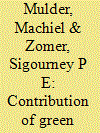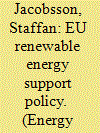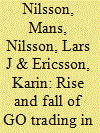|
|
|
Sort Order |
|
|
|
Items / Page
|
|
|
|
|
|
|
| Srl | Item |
| 1 |
ID:
094220


|
|
|
|
|
| Publication |
2010.
|
| Summary/Abstract |
In the European policy debate, tradable green certificates (TGC) have been suggested to be a superior regulatory framework for promoting the diffusion of renewable electricity technologies. The purpose of this paper is to assess the performance of the Swedish TGC system, contributing to the European debate on the suitability of different types of frameworks. The expectations of the TGC system were that it would: (a) be effective in terms of increasing the supply of "green" electricity; (b) do this in a cost effective manner (from both a social and a consumer perspective); (c) generate an equitable distribution of costs and benefits and (d) drive technical change. So far, it has performed adequately in terms of effectiveness and social cost effectiveness. However, consumer costs have been substantially higher than expected, very large rents are generated and, at best, it contributes marginally to technical change. Thus, a TGC framework should be selected if the overriding concern is to minimize short term social costs of reaching a certain goal with a high degree of predictability. However, it cannot be expected to also drive technical change, keep consumer costs down and be equitable. Such trade-offs need to be revealed and not obscured by analysts.
|
|
|
|
|
|
|
|
|
|
|
|
|
|
|
|
| 2 |
ID:
113475


|
|
|
|
|
| Publication |
2012.
|
| Summary/Abstract |
The performance of feed-in tariffs and tradable certificates is assessed on criteria of efficacy, efficiency, equity and institutional feasibility. In the early stage of transition to an energy system based entirely on renewable energy supplies, renewable electricity can only thrive if support takes into account the specific technical, economic and political problems which result from embedding this electricity in conventional power systems whose technology, organizational structure, environmental responsibility and general mission differ profoundly from the emerging, renewable-based system. Support schemes need to capture the diversity of power supplies, the variable nature of some renewable supplies, and their different attributes for the purposes of public policy. They must take into account the variety of generators - including small, decentralized generation - emerging in a renewable-based system, and the new relationships between generators and customers. Renewable energy policies need a clear point of reference: because the incumbent power systems are not sustainable they must adapt to the requirements of the renewable ones, not the other way round. Incumbent systems carry the responsibility of paying the transition, something that corresponds best with the polluter pays principle.
|
|
|
|
|
|
|
|
|
|
|
|
|
|
|
|
| 3 |
ID:
092854


|
|
|
|
|
| Publication |
2009.
|
| Summary/Abstract |
Renewable electricity supply is a crucial factor in the realization of a low-carbon energy economy. The understanding is growing that a full turn-over of the electricity sectors by 2050 is an elementary condition for avoiding global average temperature increase beyond 2 °C. This article adopts such full transition as Europe's target when designing renewable energy policy. An immediate corollary is that phasing-in unprecedented energy efficiency and renewable generation must be paralleled by phasing-out non-sustainable fossil fuel and nuclear power technologies. The double phasing programme assigns novel meaning to nearby target settings for renewable power as share of total power consumption. It requires organizing in the medium term EU-wide markets for green power, a highly demanding task in the present context of poorly functional markets in brown power. The EU Commission's 2007/2008 proposals of expanding tradable certificates markets were not based on solid analysis of past experiences and future necessities. The keystone of sound policies on renewable electricity development is a detailed scientific differentiation and qualification of renewable electricity sources and technologies, for measuring the huge diversity in the field. We provide but structuring concepts about such qualification, because implementation requires extensive research resources.
Support for renewable electricity development is organized via feed-in prices or premiums, and via quota obligations connected to tradable green certificates. Green certificates are dependent on physical generated renewable power, but separable and no joint products. Contrary to conventional wisdom we argue their separation in cost analysis but firm linking during trade. A few graphs illustrate the importance of assigning qualities to different renewable power sources/technologies. Feed-in systems based on an acceptable qualification perform generally better than certificate markets imposing uniform approaches on a very diverse reality. For a similar reason, uniform and undifferentiated taxation of non-sustainable energy sources cannot replace renewable energy support schemes capable of differentiation.
|
|
|
|
|
|
|
|
|
|
|
|
|
|
|
|
| 4 |
ID:
149934


|
|
|
|
|
| Summary/Abstract |
In European countries, retailers are obliged to disclose the energy source and the related environmental impacts of their portfolio over the preceding year. The electricity supplied in the Dutch retail market is presented as renewable energy for 34%, but this relatively high share is for 69% based on certificates (Guarantees of Origin) which are imported from in particular Norway. The certificates are used to sell green electricity to consumers. The premium for green electricity which is actually paid by Dutch consumers is no more than a few percentages of the retail price. The low level of this premium is related to the abundant supply of certificates at low marginal costs from Norway. This also means that the premium for green electricity is too low to give an incentive for investments in new capacity. Hence, the current labelling system for renewable electricity is mainly valuable, besides being an instrument for tracking and tracing of renewable energy, as a marketing instrument for electricity retailers. The effectiveness of Guarantees of Origin as a policy instrument to foster renewable electricity sources is weak. This effectiveness can be raised by implementing restrictions on the international trade or the issuance of new certificates.
|
|
|
|
|
|
|
|
|
|
|
|
|
|
|
|
| 5 |
ID:
176852


|
|
|
|
|
| Summary/Abstract |
Renewable Portfolio Standards (RPS) is a mandatory institutional change to realize the low-carbon transformation of energy in China. The success of its implementation depends on the scientific system design. Based on the current situation of the green certificate transaction with the severe shortage of tradable green certificate (TGC) subscription on the demand side of RPS in China and the actual economic situation of the electricity market reform, this paper uses system dynamics to build the market transaction models of benchmark on-grid price and marketed on-grid price respectively, and analyze the incentive effect of the relevant system design of RPS on the demand side of TGC. The results show that: (1) Implementing the marketed on-grid price can effectively stimulate and induce coal power plants to conduct green certificate trading. Compared with benchmark on-grid price, under marketed on-grid price, coal power plants have higher demand for TGC, higher revenue and profit, and better incentive effect. (2)Setting a scientific and reasonable price cap of TGC can effectively stimulate coal power plants to increase the consumption demand of TGC. Therefore, scientific design of the demand-side incentive system of RPS and strengthening of the power market reform will help China to implement the RPS and promote the consumption and utilization of renewable energy.
|
|
|
|
|
|
|
|
|
|
|
|
|
|
|
|
| 6 |
ID:
088212


|
|
|
|
|
| Publication |
2009.
|
| Summary/Abstract |
The recent EU Commission proposal for promoting the supply of power from renewable energy sources was originally based on a pan-European, harmonised tradable green certificate (TGC) scheme. We suggest, on the basis of a multi-disciplinary analysis, that a pan-EU TGC system is not the way forward for Europe. It is vital that the Commission (and the majority of Member States) avoids implementation of such policy designs put forward by a coalition of vested interests. They should instead look at, and act upon, the available evidence from those countries that have experimented with TGCs (e.g. Flanders, UK and Sweden) and design policies that stand a better chance of meeting the criteria of effectiveness, efficiency and equity. In particular, the policies must enable EU to meet the immense innovation/industrialisation challenge by inducing the development of a capital goods industry that can, eventually, diffuse a broad range of technologies that use renewable energy sources. Only then we can acquire an ability to implement an industrial revolution in the energy system in a way that broadly meets the criteria of effectiveness and dynamic efficiency.
|
|
|
|
|
|
|
|
|
|
|
|
|
|
|
|
| 7 |
ID:
192789


|
|
|
|
|
| Summary/Abstract |
This paper studies the ownership structure among participants in the Swedish tradable green certificate (TGC) system and its implications for TGC prices. First, we investigate cross-ownership – a situation when a firm is active on both the demand and supply sides of the TGC market – by linking suppliers and obliged parties to their parent firms. Next, we calculate indexes of market concentration that account for cross-ownership. Finally, we use detailed TGC transaction-level data to analyze differences in the prices of the TGCs traded by cross-ownership versus non-cross-ownership firms. Our results show considerable cross-ownership, with many firms active on both TGC supply and demand sides. However, even after accounting for cross-ownership, the market concentration of the entire TGC market is low and has decreased over time. Despite the absence of market concentration, our analysis of TGC prices indicates that cross-ownership firms have the ability to differentiate TGC prices from non-cross-ownership firms. Such behavior is consistent with the behavioral assumption that the ultimate owner's objective is to maximize the total profit of the portfolio of shares, and that, therefore, the pricing behavior would differ from that of a perfectly competitive firm without ownership links to other firms in the industry.
|
|
|
|
|
|
|
|
|
|
|
|
|
|
|
|
| 8 |
ID:
125813


|
|
|
|
|
| Publication |
2013.
|
| Summary/Abstract |
A system of Tradable Green Certificates (TGCs) is a market-based subsidy scheme designed to promote electricity generation from renewable energy sources such as wind power. Under a TGC system, the principal policy instrument is the "percentage requirement," which stipulates the percentage of total electricity production ("green" plus "black") that must be obtained from renewable sources. In this paper, we propose a regulatory adjustment process that a regulator can employ to determine the socially optimal percentage requirement, explicitly accounting for environmental damages resulting from black electricity generation.
|
|
|
|
|
|
|
|
|
|
|
|
|
|
|
|
| 9 |
ID:
092613


|
|
|
|
|
| Publication |
2009.
|
| Summary/Abstract |
This paper examines policy processes surrounding the rise and fall of the proposed EU-wide policy instrument designed to help achieve the EU's renewable energy targets-the trading of Guarantees of Origin (GO). It discusses its origins and examines factors in the policy processes over time leading first to its development and then to its abandonment. A first analysis looks at the near-term policy-making process before and after the proposal on GO trading in January 2008, focusing on the European policy-making institutions and influences of interest groups and member state governments. It then takes a step back and looks over a longer time period at how competing policy frames have shaped the agendas underlying the debate. Results show how a strong internal market frame acted as a primary driving force in the Commission to promote the GO trading instrument. The rejection of the GO trading proposal in the Council and Parliament can be largely attributed to the lack of a strong lobby in favour of GO, the accumulated experience with and institutionalisation of national RES support policies such as feed-in tariffs, and growing general political concerns for supply security, innovation and competitiveness.
|
|
|
|
|
|
|
|
|
|
|
|
|
|
|
|
| 10 |
ID:
068420


|
|
|
|
|
|
|
|